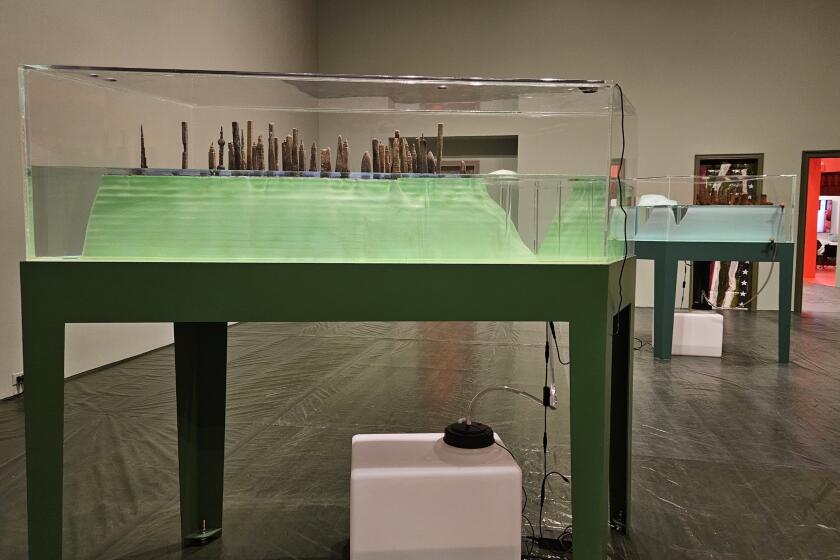A New Stage : Dana Elcar, who will play in ‘Waiting for Godot,’ is learning that blindness doesn’t have to stop him from being active.
Dana Elcar, artistic director of the Santa Paula Theatre Center, has more than 40 years experience as a successful television and film actor, and he has trod the boards in countless theaters.
Nevertheless, he told me recently that his worst fear is that he will step off the stage during a performance.
This concern is new. But so is Elcar’s blindness.
Two and a half years ago Elcar, who is in his early 60s, finally lost a 30-year battle with glaucoma. And the eye disease has left him legally blind.
Yet Elcar considers himself lucky because he has enjoyed a long career in an unpredictable trade.
Adding to his good fortune, he has been cast as Vladimir by director Deborah Lavine in the Santa Paula Theatre Center’s production of “Waiting for Godot,” which opens June 26.
“Glaucoma can happen to anyone,” said Elcar during an interview at the theater after a rehearsal. “That’s the unfortunate thing about it. I had gone for over 30 years without complete loss of vision. And I still had enough central vision to drive a car, read and ride a bicycle,” recalled Elcar.
Then retinal hemorrhaging in both eyes claimed his sight.
“It is very important to stay active,” said Elcar. Fortunately, producers for the popular television show “MacGyver,” in which Elcar has a major role, decided to write his condition into the script. And Elcar was able to continue his role in the 7-year-old series until production of new episodes finally ceased a few months ago. Nevertheless, the series can still be widely seen in syndications and reruns.
“It allowed me to keep active and go through the process of losing my sight while I was still working as an actor,” Elcar said.
And he is very grateful for the supportive actions of his colleagues. In turn, he has supported charitable events and become involved with organizations that seek to prevent blindness and aid the vision-impaired.
So Elcar still has not had the time to attend mobility school or to learn to read Braille.
But he is able to navigate on stage by relating to the voices of fellow actors. And he can use his white-tipped cane in familiar surroundings.
“My daughter and I can still go for a walk. Or we can jog together if we each hold onto an end of my cane.”
After the rehearsal, Elcar climbed into my car and continued the interview while I drove him to his home. He admitted that adjusting to his condition has been difficult and acknowledged the effect his blindness has had on his family.
Dana and Marianne Elcar, the theater center’s general manager, have been married for 15 years. They have an 8-year-old son and their daughter is 11.
“It’s a very upsetting experience for young children if either of their parents loses any of their faculties,” he said. “It creates insecurity. And they have to take on responsibilities like leading me to a car so I don’t bump into a tree.”
Elcar advised people dealing with vision impairment or blindness not to give in to depression. He said at first people experience denial, then anger.
“I wanted to sleep a lot. And if you are a drinker, you may drink too much,” he said.
Now, he said, with the support of friends and family, he is looking forward to new acting opportunities. And he has written some screenplays that are being considered for production.
Then we had arrived at the Elcar residence.
As Elcar let himself out of the car and headed for the gate, his family and two enthusiastic French poodles appeared from the yard to greet him.
“Being blind does make a difference,” Elcar admitted. “But it doesn’t mean the end of life or the end of the creative process.”
HELP FOR THE BLIND
More than half of the people afflicted with blindness and vision impairment are age 65 and older. The following resources can provide help:
* The Braille Institute in Los Angeles provides orientation and mobility training, Braille lessons and community center programs. Its library book service provides large-print, Braille and “talking books” (on tape), and the necessary equipment to use them. The press service can convert printed items to Braille. Visual aids, including magnifying and specialized lighting devices, are available to enhance impaired vision. All its services are free of charge and available to anyone who is visually impaired or legally blind. Residents of northern Ventura County, including Camarillo, should call (805) 682-6222. South county residents should call (213) 663-1111.
* The Braille Institute conducts free weekly educational, social and recreational “Community Center Program” classes from 10 a.m. to 2 p.m. at senior adult centers in Oxnard, Ventura, Simi Valley, Camarillo, Ojai and Thousand Oaks to help people deal with their vision loss. Participants, who average 79 years of age, learn independent living and home management skills. Transportation is available to all sites, except Camarillo and Ventura, where volunteer drivers are needed. Call (805) 983-4509. For information about the program in Thousand Oaks, call (818) 884-2840.
More to Read
The biggest entertainment stories
Get our big stories about Hollywood, film, television, music, arts, culture and more right in your inbox as soon as they publish.
You may occasionally receive promotional content from the Los Angeles Times.






